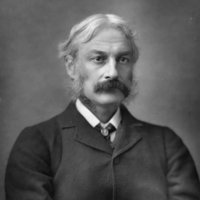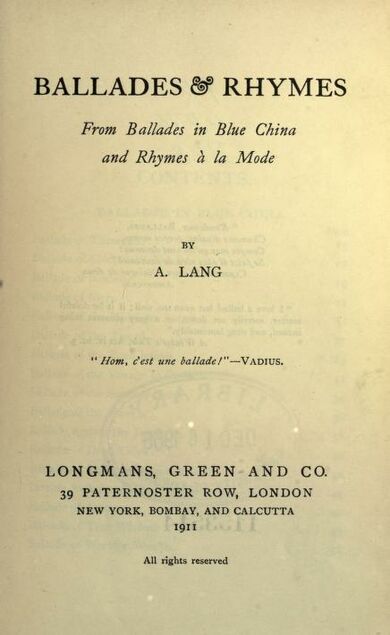The Battle of Harlaw—Evergreen Version
Frae Dunidier as I cam throuch,
Doun by the hill of Banochie,
Allangst the lands of Garioch.
Grit pitie was to heir and se
The noys and dulesum hermonie,
That evir that dreiry day did daw!
Cryand the corynoch on hie,
Alas! alas! for the Harlaw.
I marvlit what the matter meant;
All folks were in a fiery fariy:
I wist nocht wha was fae or freind,
Yet quietly I did me carrie.
But sen the days of auld King Hairy,
Sic slauchter was not hard nor sene,
And thair I had nae tyme to tairy,
For bissiness in Aberdene.
Thus as I walkit on the way,
To Inverury as I went,
I met a man, and bad him stay,
Requeisting him to mak me quaint
Of the beginning and the event
That happenit thair at the Harlaw;
Then he entreited me to tak tent,
And he the truth sould to me schaw.
Grit Donald of the Ysles did claim
Unto the lands of Ross sum richt,
And to the governour he came,
Them for to haif, gif that he micht,
Wha saw his interest was but slicht,
And thairfore answerit with disdain.
He hastit hame baith day and nicht,
And sent nae bodward back again.
But Donald richt impatient
Of that answer Duke Robert gaif,
He vow’d to God Omniyotent,
All the hale lands of Ross to half,
Or ells be graithed in his graif:
He wald not quat his richt for nocht,
Nor be abusit like a slaif;
That bargin sould be deirly bocht.
Then haistylie he did command
That all his weir-men should convene;
Ilk an well harnisit frae hand,
To melt and heir what he did mein.
He waxit wrath and vowit tein;
Sweirand he wald surpryse the North,
Subdew the brugh of Aberdene,
Mearns, Angus, and all Fyfe to Forth.
Thus with the weir-men of the yles,
Wha war ay at his bidding bown,
With money maid, with forss and wyls,
Richt far and neir, baith up and doun,
Throw mount and muir, frae town to town,
Allangst the lands of Ross he roars,
And all obey’d at his bandown,
Evin frae the North to Suthren shoars.
Then all the countrie men did yield;
For nae resistans durst they mak,
Nor offer batill in the feild,
Be forss of arms to beir him bak.
Syne they resolvit all and spak,
That best it was for thair behoif,
They sould him for thair chiftain tak,
Believing weil he did them luve.
Then he a proclamation maid,
All men to meet at Inverness,
Throw Murray land to mak a raid,
Frae Arthursyre unto Spey-ness.
And further mair, he sent express,
To schaw his collours and ensenzie,
To all and sindry, mair and less,
Throchout the bounds of Byne and Enzie.
And then throw fair Strathbogie land
His purpose was for to pursew,
And whatsoevir durst gainstand,
That race they should full sairly rew.
Then he bad all his men be trew,
And him defend by forss and slicht,
And promist them rewardis anew,
And mak them men of mekle micht.
Without resistans, as he said,
Throw all these parts he stoutly past,
Where sum war wae, and sum war glaid,
But Garioch was all agast.
Throw all these feilds be sped him fast,
For sic a sicht was never sene;
And then, forsuith, he langd at last
To se the bruch of Aberdene.
To hinder this prowd enterprise,
The stout and michty Erl of Marr
With all his men in arms did ryse,
Even frae Curgarf to Craigyvar:
And down the syde of Don richt far,
Angus and Mearns did all convene
To fecht, or Donald came sae nar
The ryall bruch of Aberdene.
And thus the martial Erle of Marr
Marcht with his men in richt array;
Befoir his enemis was aware,
His banner bauldly did display.
For weil enewch they kent the way,
And all their semblance well they saw:
Without all dangir or delay,
Come haistily to the Harlaw.
With him the braif Lord Ogilvy,
Of Angus sheriff principall,
The constable of gude Dunde,
The vanguard led before them all.
Suppose in number they war small,
Thay first richt bauldlie did pursew,
And maid thair faes befor them fall,
Wha then that race did sairly rew.
And then the worthy Lord Salton,
The strong undoubted Laird of Drum,
The stalwart Laird of Lawristone,
With ilk thair forces all and sum.
Panmuir with all his men, did cum,
The provost of braif Aberdene,
With trumpets and with tuick of drum,
Came schortly in thair armour schene.
These with the Earle of Marr came on,
In the reir-ward richt orderlie,
Thair enemies to sett upon;
In awfull manner hardilie,
Togither vowit to live and die,
Since they had marchit mony mylis,
For to suppress the tyrannie
Of douted Donald of the Ysles.
But he, in number ten to ane,
Right subtile alang did ryde,
With Malcomtosch, and fell Maclean,
With all thair power at thair syde;
Presumeand on their strenth and pryde,
Without all feir or ony aw,
Richt bauldie battil did abyde,
Hard by the town of fair Harlaw.
The armies met, the trumpet sounds,
The dandring drums alloud did touk,
Baith armies byding on the bounds,
Till ane of them the feild sould bruik.
Nae help was thairfor, nane wald jouk,
Ferss was the fecht on ilka syde,
And on the ground lay mony a bouk
Of them that thair did battil byd.
With doutsum victorie they dealt,
The bludy battil lastit lang;
Each man fits nibours forss thair felt,
The weakest aft-tymes gat the wrang:
Thair was nae mowis thair them amang,
Naithing was hard but heavy knocks,
That eccho mad a dulefull sang,
Thairto resounding frae the rocks.
But Donalds men at last gaif back,
For they war all out of array:
The Earl of Marris men throw them brak,
Pursewing shairply in thair way,
Thair enemys to tak or slay,
Be dynt of forss to gar them yield;
Wha war richt blyth to win away,
And sae for feirdness tint the feild.
Then Donald fled, and that full fast,
To mountains hich for all his micht;
For he and his war all agast,
And ran till they war out of sicht;
And sae of Ross he lost his richt,
Thocht mony men with hem he brocht;
Towards the yles fled day and nicht,
And all he wan was deirlie bocht.
This is (quod he) the richt report
Of all that I did heir and knaw;
Thocht my discourse be sumthing schort,
Tak this to be a richt suthe saw:
Contrairie God and the kings law,
Thair was spilt mekle Christian blude,
Into the battil of Harlaw:
This is the sum, sae I conclude.
But yet a bonnie while abide,
And I sall mak thee cleirly ken
What slaughter was on ilkay syde,
Of Lowland and of Highland men,
Wha for thair awin haif evir bene;
These lazie lowns micht weil be spared,
Chased like deers into their dens,
And gat their wages for reward.
Malcomtosh, of the clan heid-cheif,
Macklean with his grit hauchty heid,
With all thair succour and relief,
War dulefully dung to the deid;
And now we are freid of thair feid,
They will not lang to cum again;
Thousands with them, without remeid,
On Donald’s syd, that day war slain.
And on the uther syde war lost,
Into the feild that dismal day,
Chief men of worth, of mekle cost,
To be lamentit sair for ay.
The Lord Saltoun of Rothemay,
A man of micht and mekle main;
Grit dolour was for his decay,
That sae unhappylie was slain.
Of the best men amang them was
The gracious gude Lord Ogilvy,
The sheriff-principal of Angus,
Renownit for truth and equitie,
For faith and magnanimitie;
He had few fallows in the field,
Yet fell by fatall destinie,
For he naeways wad grant to yield.
Sir James Scrimgeor of Duddap, knicht,
Grit constabill of fair Dunde,
Unto the dulefull deith was dicht;
The kingis cheif bannerman was he,
A valiant man of chevalrie,
Whose predecessors wan that place
At Spey, with gude King William frie
‘Gainst Murray, and Macduncan’s race.
Gude Sir Allexander Irving,
The much renowit laird of Drum,
Nane in his days was bettir sene
When they war semblit all and sum.
To praise him we sould not be dumm,
For valour, witt, and worthyness;
To end his days he ther did cum
Whose ransom is remeidyless.
And thair the knicht of Lawriston
Was slain into his armour schene,
And gude Sir Robert Davidson,
Wha provost was of Aberdene:
The knicht of Panmure, as was sene,
A mortall man in armour bricht,
Sir Thomas Murray, stout and kene,
Left to the warld thair last gude nicht.
Thair was not sen King Keneths days
Sic strange intestine crewel stryf
In Scotland sene, as ilk man says,
Whare mony liklie lost thair lyfe;
Whilk maid divorce twene man and wyfe,
And mony childrene fatherless,
Whilk in this realme has bene full ryfe:
Lord help these lands, our wrangs redress.
In July, on Saint James his even,
That four and twenty dismall day,
Twelve hundred, ten score and eleven
Of theirs sen Chryst, the suthe to say,
Men will remember, as they may,
When thus the ventie they knaw,
And mony a ane may murn for ay,
The brim battil of the Harlaw.


